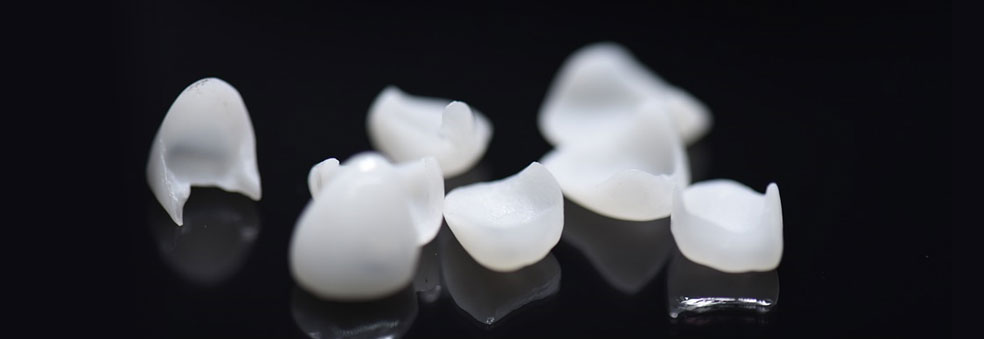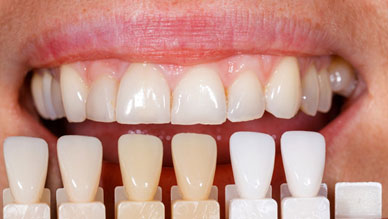Everything You Need To Know About Dental Veneers

What Are Dental Veneers?
Dental veneers are thin coverings that adhere to your teeth to improve their appearance.
It’s visible when a person smiles, and designed to match the colour of your natural teeth.
Not only can veneers make a smile more visually pleasing, but they can also conceal minor crowding, discoloration, chipped tooth, misshapen teeth and gaps. Dental veneers are a possible solution to help you achieve the confident smile that you want.
The dental veneers made for you will be different from those provided to other patients. Each patient is provided veneers of a specific size, shape, color, and fit.
There are many materials options available for veneers, however, the most popular choices are porcelain and ceramic.

Veneers look like natural teeth. If your aim is to improve your smile, dental veneers may be a good and simple option. Veneers are used to correct various dental issues such as:
- Stained teeth, discolouration and blotches
- Chipped or eroded teeth
- Worn teeth
- Fracture lines and cracks
- Crooked or misshapen teeth
- Large gap between the upper front teeth
- Uneven spaces
Dental veneers offer you the advantage of changing the size, colour, and shape of your teeth. They can make gaps between your teeth less obvious by filling in empty spaces and they may also hide tooth overlap so that your teeth appear straighter.
If you’re looking for dental veneers, our dentists at uSmile Dental can evaluate your smile to give you an idea of what you can expect from the treatment itself and the results of veneers.
There are two common types of dental veneers out there: composite resin and porcelain. The best type for you to use for your dental veneers depends on your desired results and allocated budget.

Composite veneers are usually placed on the tooth in just one appointment. They are made of a composite resin material applied directly to your teeth. Your dentist bonds and shapes the veneer to best match your teeth.
While composite veneers are a more affordable option, they only last 4-8 years and require more maintenance as they are more prone to chipping.
The biggest advantage that composite veneers have over porcelain is reversibility. Composites are less invasive than porcelain veneers meaning your teeth are not permanently altered to such an extent that the material cannot be removed and replaced as needed. As opposed to porcelain, which requires reshaping of your natural teeth in order to fit the veneer.

Porcelain veneers are custom made for your teeth using impressions of your teeth, so the veneers can be made from the mould in a laboratory. Just like with the indirect composite veneers, you’ll receive a set of temporary veneers while you wait for your permanent ones.
Once ready, your dentist will cement the veneers to the front of your teeth and make them look as natural as possible.
Porcelain veneers are a more durable and longer-lasting option because they last 12-25 years and rarely require maintenance.

Composite veneers are less risky and may be all you need. At least they can be repaired easily. And there is no damage to underlying teeth.
Porcelain is stronger and lasts longer. Won’t discolour, but is more expensive.
Either way, you can’t be eating hard lollies with composite or porcelain veneers on front teeth; it’s risky. Even porcelain on full crowns will fracture in some circumstances.
Which one you choose ultimately depends on your priorities. Would you rather spend more and achieve a longer lasting result as you get with the porcelain veneers, or go for the lower risk lower priced option as you get with the composite veneers?
uSmile Dental offers a variety of dental veneer options to choose from. We’ve helped hundreds of patients apply either type of veneer, so during your initial consultation, our team can help you make the best decision for your smile.

The cost of your veneer treatment will depend on the type of veneers used, number of appointments required, and the number of teeth that will be receiving treatment.
At uSmile Dental, the cost of a single composite veneer starts at $300
The reason composite veneers are so affordable is due to the quality of material. Porcelain veneers have a higher price tag than composite veneers, but they last longer and give a more natural-looking appearance.
The cost of a single porcelain veneer starts at $1,200, but we do offer reduced price packages when you opt in for multiple veneers for people looking to improve the appearance of their entire smile.
You can book an appointment with us to get professional advice, a personalised treatment plan and a price before committing to any treatment.
Before getting veneers, your teeth and gums must be healthy. Your dentist must treat any decay before veneers are put on.
For patients who clench or grind their teeth, veneers are not always a good choice because the thin veneers may chip or break. Your dentist may recommend you wear a dental night guard while sleeping if you clench or grind your teeth.
There is a tendency for veneers to come loose over time so new ones might be needed. Regular dental visits are important for keeping your teeth and gums healthy. Discuss with us at uSmile Dental all your expectations and treatment options.

Veneers can be applied in a simple procedure that can be done in only a few visits. Here’s what you can expect:
- Diagnosis. The first step is always a consultation with your expert dentists at uSmile Dental to discuss your treatment options and the result that you are trying to achieve. Your teeth will be examined to ensure dental veneers are suitable for you. X-rays may be taken to get impressions of your teeth and mouth.
- Preparation. To prepare a tooth for veneers, your dentist will reshape your tooth surface. Before trimming off the enamel, options such as local anaesthetic can be used to reduce pain and numb the area. Next, a model or impression of your tooth will be taken by your dentist. The impression taken will be sent out to a dental laboratory for the construction of your veneer.
- Creation. Around 2-4 weeks after your impression is sent off to a dental laboratory, you will be able to receive your freshly constructed veneers.
- Bonding Placement. To prepare your tooth to receive the veneer, your dentist will clean and polish your tooth. Also, roughening the surface of your tooth by etching helps to strengthen the bonding. Your dentist will place it on your tooth temporarily to assess its fit and color. Your veneer will be repeatedly removed and trimmed as needed to get the right fit. As for the color, it can be adjusted with the shade of cement to be used.
- Placement. After bonding, your dentist will apply a special cement to your veneers before placing them on your teeth. Once in the correct position, your veneer will be photopolymerised. Your dentist will apply a special light beam to the veneer, which activates chemicals in the cement, causing it to harden very quickly.
- Adjustments. Your dentist will then make any needed final adjustments, removing any excess cement and assessing your bite. You may be asked to return for a follow-up visit to check how your gums are responding to the presence of your veneers and examine again your veneer’s placement.

After getting veneers, be careful not to bite your fingernails and chew on hard objects, such as pencils or ice because veneers have a tendency to chip or break under pressure. It may take you a few days to get used to the feel of your veneers. However, during your veneer placement, let your dentist know if your bite does not feel right for her to be able to correct it before you leave the office.
As always, keep your teeth and gums healthy and clean by always brushing and flossing each day. You can still get cavities under or around your veneers.
If you’re looking to improve your smile, dental veneers could be a great choice for you. They’re essentially a semi-permanent solution to imperfect teeth.
Take the time to explore your options before you decide. Better yet, talk to us at uSmile Dental to determine the best choice for your smile.
To learn more, you can book an appointment online, email us at [email protected] or call us at 02 8084 9118.
We want to give you an experience you can smile about! Call or message us for a consultation!
Book an Appointment Today For a Healthy and Confident Smile
Copyright © 2024 USmile Dental. All Rights Reserved. | Digital Agency - Supple






